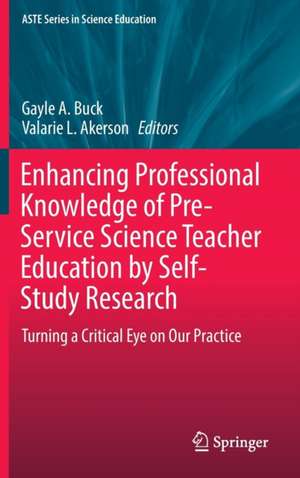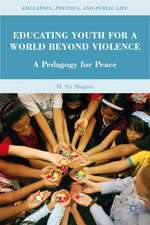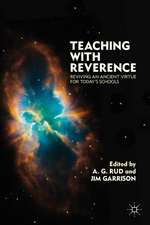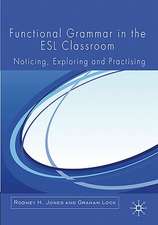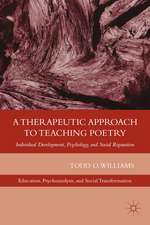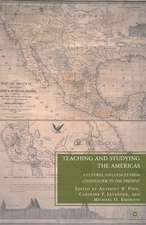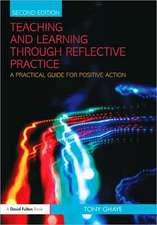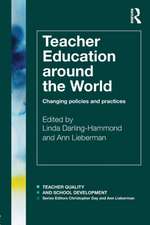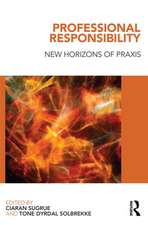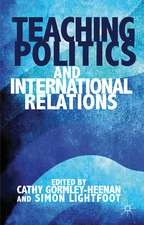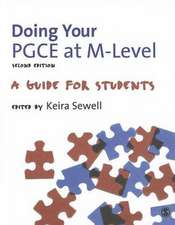Enhancing Professional Knowledge of Pre-Service Science Teacher Education by Self-Study Research: Turning a Critical Eye on Our Practice: ASTE Series in Science Education
Editat de Gayle A. Buck, Valarie L. Akersonen Limba Engleză Hardback – iul 2016
| Toate formatele și edițiile | Preț | Express |
|---|---|---|
| Paperback (1) | 649.39 lei 6-8 săpt. | |
| Springer International Publishing – 31 mai 2018 | 649.39 lei 6-8 săpt. | |
| Hardback (1) | 655.78 lei 6-8 săpt. | |
| Springer International Publishing – iul 2016 | 655.78 lei 6-8 săpt. |
Preț: 655.78 lei
Preț vechi: 771.50 lei
-15% Nou
Puncte Express: 984
Preț estimativ în valută:
125.50€ • 129.65$ • 104.45£
125.50€ • 129.65$ • 104.45£
Carte tipărită la comandă
Livrare economică 25 martie-08 aprilie
Preluare comenzi: 021 569.72.76
Specificații
ISBN-13: 9783319324456
ISBN-10: 3319324454
Pagini: 240
Ilustrații: XI, 467 p. 11 illus.
Dimensiuni: 155 x 235 x 27 mm
Greutate: 0.84 kg
Ediția:1st ed. 2016
Editura: Springer International Publishing
Colecția Springer
Seria ASTE Series in Science Education
Locul publicării:Cham, Switzerland
ISBN-10: 3319324454
Pagini: 240
Ilustrații: XI, 467 p. 11 illus.
Dimensiuni: 155 x 235 x 27 mm
Greutate: 0.84 kg
Ediția:1st ed. 2016
Editura: Springer International Publishing
Colecția Springer
Seria ASTE Series in Science Education
Locul publicării:Cham, Switzerland
Cuprins
Forward:Building on Findings from Self-Studies in Science Education, John Loughran.- PartI Introduction: Self-Studies and Science Education.- Garnering theUnderstandings Emerging from Self-Studies in Science Teacher Education, GayleA. Buck, Valarie L. Akerson and Brent Gilles.- Self Study in Pre-ServiceScience Teacher Education, Allan Feldman.- Part II Self-Studies and ScienceContent Courses for Teachers.- Promoting Student Agency in Science Inquiry: ASelf-Study of Relational Pedagogical Practices in Science Teacher Education, AmyTrauth-Nare, Gayle A. Buck & Nicole Beeman-Cadwallader.- Using Self-Studyto Learn to Teach Genetics to Pre-Service Teachers for Understanding and forTeaching, Eunice Nyamupangedengu.- Using Self-Study to Evaluate a PedagogicalApproach for Navigating Conflicts in a Science Content Course for PreserviceTeachers, Sarah Quebec Fuentes & Mark Bloom.- Exploring our Theoretical andPractical Understanding of Enthusiasm in Science Teaching: A Self-Study of ElementaryTeacher Preparation, Brent Gilles & Gayle A. Buck.- Response of Section II:Practicing, Modeling, and Influencing Approaches to Teaching – A Commentary, MichaelBowen.- Part III Self-Studies and Elementary Science Methods Courses.- EvolvingGoals, Pedagogies, and Identities as an Elementary Science Teacher Educator: PrioritizingPractice, Elizabeth A. Davis.- Our Journey of Understanding through Lesson Study,Stephen Marble, Michael Kamen, Gilbert Naizer & Molly Weinburgh.- HowScience Teacher Educators of Color Conceptualize and Operationalize theirPedagogy in Science Methods Courses, Karthigeyan Subramaniam, Sumreen Asim, EunYoung Lee & Kia S. Rideaux.- Uncertainties of Learning to Teach ElementaryScience Methods Using Engineering Design: A Science Teacher Educator’s Self-Study,Brenda M. Capobianco.- Response of Section III: Self-Studies of ElementaryScience Teacher Education: Insights, Implications, and Future ResearchDirections, Lucy Avraamidou.- Part IV Self-Studiesand Secondary Science Methods Courses.- Experiences with Activities DevelopingPre-Service Science Teacher Data Literacy, G. Michael Bowen, Anthony Bartley,Leo MacDonald & Ann Sherman.- Going Beyond the Status Quo: A LongitudinalSelf-Study of a School Based Science Teacher Preparation Program, Nidaa Makki& Gary Holliday.- Biology Student Teachers’ Reflections in Eportfolios as aTrigger for Self-Study of a Teacher Educator, Lindsey N. Connor.- Response ofSection IV, Gillian Roehrig.- Part V. Self-studies and the Preparation ofFuture Science Teacher Educators.- Finding the Means to Initiate and Sustain aTeacher Educator’s Pedagogical Content Knowledge (PCK) Development in Science Education, Anne Hume.- Trash orTreasure? Re-conceptualizing My Ruins as a Tool for Re-Imagining the Nature ofScience Teacher Education, Maria F.G. Wallace.- Supporting New Members as They Transitioninto our Science Educational Community of Practice, Gayle A. Buck & ValarieL. Akerson.- DevelopingKnowledge of Practice through Self-Study: Becoming a Science Teacher Educator, JenniferMansfield, John Loughran & Gillian Kidman.- Response to Section V:Reflections on Self-Studies and the Preparation of Future Science TeacherEducators, Justin Dillon.- VI. Epilogue.- Here’s Looking at You Kid: When theResearcher Becomes the Sample, Norman G. Lederman & Judith S. Lederman.- Turning a Critical Eye on OurPractice: Influence of Current Stories, Valarie L. Akerson & Gayle A. Buck.-VIII. Afterward, Joanne K. Olson.- Index.
Textul de pe ultima copertă
Self-study research is making an impact on the field of science education. University researchers employ these methods to improve their instruction, develop as instructors, and ultimately, impact their students’ learning. This volume provides an introduction to self-study research in science education, followed by manuscripts of self-studies undertaken by university faculty and those becoming university faculty members in science teacher education. Chapter authors range from those new to the field to established researchers, highlighting the value of self-study research in science teacher education for every career rank. The fifteen self-studies provided in this book support and extend this contemporary work in science teacher education. They, and the subsequent reflections on professional knowledge, are organized into four sections: content courses for preservice teachers, elementary methods courses, secondary methods courses, and preparation of future teacher educators. Respondents from various locations around the globe share their reflections on these sections. A culminating reflection of the findings of these studies is provided at the end of the book that provides an overview of what we have learned from these chapters, as well as a reflection on the role of self-study research in the future of science teacher education.
Caracteristici
Compiles self-studies in science teacher education highlighting methods, content, and doctoral level courses to foster discussion on complexities of science teacher education Analysesthe current and potential impact that self-study research makes and can make onthe field of science teacher education Sharesimplications for future research in science teacher education using self study
